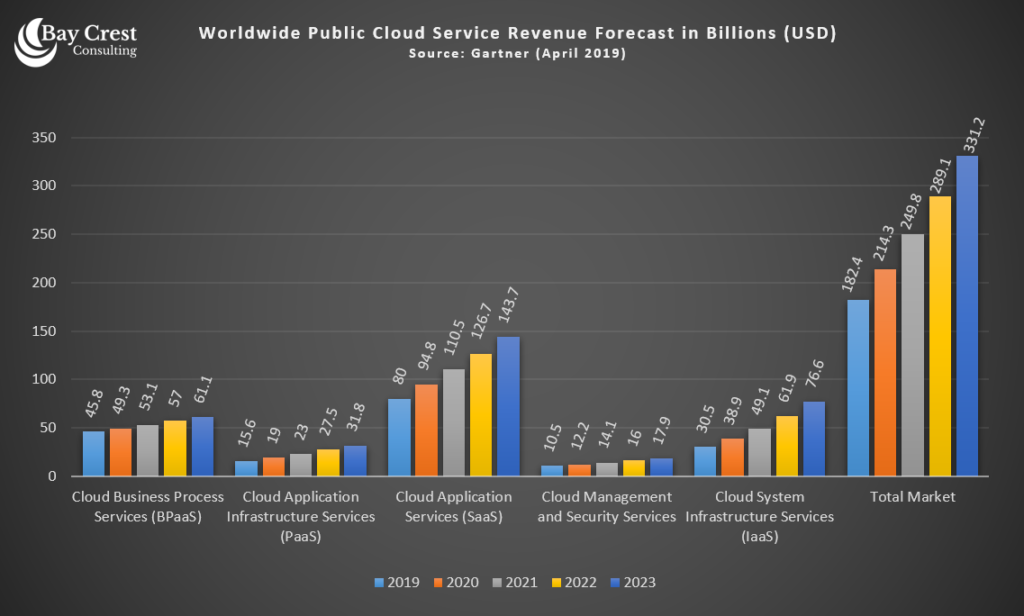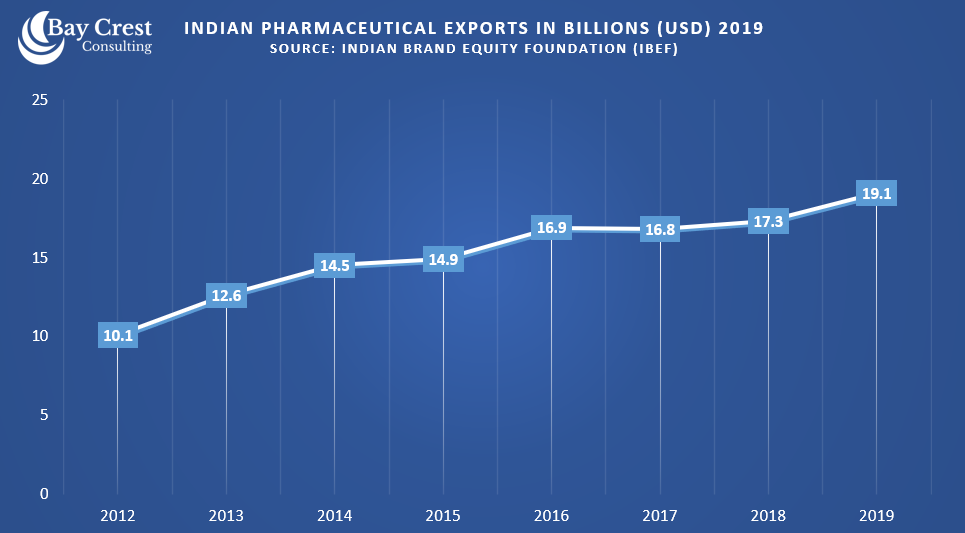The world is facing a cataclysmic change because of COVID-19, a world-wide pandemic which is triggering a metamorphosis. Every day, we wake up to a slightly different world, demanding slightly different skills from each one of us. Imagining a post COVID world is a herculean task, but emerging patterns in data allow us to draw some idea of the way forward. These unprecedented circumstances have come as a blessing to a few sectors that are set to witness growth in the near future. We at Bay Crest, believe that these are some of the most promising sectors based on their past growth over the years, as well as optimistic forecasts, shown through the data below:
1. Education (E-learning)
One demographic that has taken a hit is the student population across the globe. Most governments across the world have temporarily shut educational institutions to control the spread of the virus. This has resulted in about 1.3 to 1.5 billion students being affected globally, a total of approximately 70% of the student population. Several countries have implemented localized closures that have impacted millions of additional learners.
What was once a novelty is now a norm; The closure of institutions has led to online classes abruptly becoming a lifestyle for all their students. Many e-learning platforms have begun to offer high discounts on various courses and have made certain courses available for free, ever since the pandemic acted as a catalyst and quickened the growth of the sector. The Indian online learning market was valued at INR 39 billion and is set to hit an astronomical INR 360.3 billion by 2024, according to data from BusinessWire, a Berkshire Hathaway subsidiary. Though most of the schools and universities have taken to remote learning, it is still a distant dream for students in relatively poorer countries like India and Pakistan.
2. Information Technology
Data:
With the onset of COVID-19 a large number of people shifted to working from home which resulted in a huge spike in data usage across the globe. Statistics show that global data usage has increased as much as 38% year-on-year in the wake of the pandemic.
Public Cloud:
The Cloud has emerged as a backbone for IT infrastructure at most companies around the world. In November 2019, Gartner predicted that the worldwide public cloud service market would grow 17% in 2020. A study by Instinet in March 2020 showed that 68% of CIOs express the need to move to cloud and COVID-19 has helped accelerate this migration.
Cybersecurity:
The demand for ethical hackers and security architects is on the rise as “Work from Home” allows a company’s data to be at greater risk. With employees depending on less secure internet connections, CTOs at major firms are pushing companies to take on expenditures to raise their security measures and standards.

Source: Gartner (April 2019)
BPaaS = business process as a service; IaaS = infrastructure as a service; PaaS = platform as a service; SaaS = software as a service
3. Medical and Pharma
Governments have begun to actively boost these two sectors which are at the epicentre of the pandemic. If the Great Recession in 2008 was about financial and banking reforms the global pandemic in 2020 will ensure greater health reforms and securities for their citizenry.
According to the Indian Brand Equity Foundation (IBEF), pharmaceutical exports in India have grown steadily from $10 billion (2012) to $19 billion (2019). Recent estimates show that India accounts for about 10% of world’s pharmaceutical production by volume and 1.5% by value. It is the world’s largest supplier of generic drugs and controls around 18% of the global market. It also caters to a staggering 50% of global vaccine demands.

Source: Indian Brand Equity Foundation (IBEF)
Over the past few years, particularly since 2014, the number of people coming to India for medical treatment has grown annually at about 55%. According to the Ministry of Tourism, the sphere of medical tourism was valued at around $3 billion in 2015, which steadily grew to $9 billion in 2020.
Since the outbreak, exports of essential medicines like hydroxychloroquine has shot up. The pharma industry in India provides a fertile ground to keep up with the growing demand of these drugs worldwide.
4. E-commerce
According to CNBC, “Prior to the COVID-19 pandemic, 43% of Americans say they rarely or never shopped online. Now, 90 % say they have bought something online.” A majority of Indian households depend on their round-the-corner local grocery stores, but social distancing norms have led to a shift in their buying habits;
Amazon has been dominating in countries worldwide for a while now and the pandemic has only brought more to their revenue stream. Grofers, Milkbasket and Bigbasket have begun to offer contactless delivery. Other online services like Swiggy and Zomato have expanded their reach into e-retail.
These companies are witnessing a 20% to 80% surge in their order volumes despite numerous challenges like order delays and cancellations. The pandemic is pushing people to change their mindsets and adapt to e-commerce and this is expected to continue even after COVID sees an end.
5. Online Banking
A study by Lightico (US data, March 15, 2020), showed that citizens are now re-evaluating the way their cash transactions take place:
- 82% of consumers are concerned about going to their bank.
- 73% are doing more remote work and/or errands.
- 63% are more inclined to try a digital app.
The Prime Minister of India, Narendra Modi, recently tweeted, “This is the time to ensure social distancing. Digital payments help you do that. Let’s listen to these stalwarts and adopt digital payments.” With leaders pushing for online banking and institutions like RBI (Reserve Bank of India) urging to move online, the country is said to see a spike in online transactions and persistent growth in the Fin-tech sector.
Data literacy is being called,”The fuel for the fourth industrial revolution.” Forbes predicts; Companies that are hiring after a pandemic will scout for candidates who are adaptable, tech savvy, and data literate. ” With the right data, companies will be able to predict the forthcoming trends in consumerism and help grow their top line. This pandemic has thrown a curve-ball at all job-seekers, be it young students fresh out of universities or men and women looking to restart their careers. With job markets evolving by the day the demand for individuals to change and grow becomes a priority.
If you enjoyed this article, you can find more on The Bay Crest Blog or follow us on Twitter for daily posts!
References:
- COVID-19 crisis will open up opportunities for India’s Pharma industry that must be seized, The Wire.
- Here are five sectors that will shine brighter post COVID-19, Yourstory.
- Online education market in India worth INR 360 billion by 2024, Businesswire
- Eight job skills to succeed in a post-coronavirus world, Forbes.
- Coronavirus impact on health sector, Economic Times.
- Top 5 job skills to future proof your career post COVID-19, Hindustan Times.
- Gartner Forecasts Worldwide Public Cloud Revenue to Grow 17.5 Percent in 2019, Gartner
- Pharmaceutical Exports From India, IBEF
Acknowledgements:
- Author: Moksha Tamma, Content Writer, Bay Crest Consulting
- Editor: Tarunn Bhende, Director, Bay Crest Consulting


Recent Comments